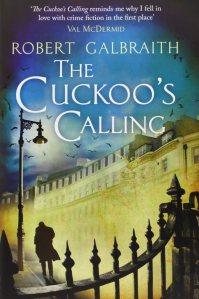 I really felt for J. K. Rowling when she was outed as the author of this, the first in a new crime series, under the pseudonym, Robert Galbraith. She could have lived off the Harry Potter novels for the rest of her life, but her first adult novel, The Casual Vacancy, showed that she was keen to keep writing. The assumption of a pseudonym showed that she wanted some objective assessment of her work. As professional critics have made clear time and again, their response to her writing is profoundly influenced by their emotions about her wealth and fame. For the most part, whenever she publishes something new the knives are out, because there’s a quota for how much good press a person gets, and it’s a pretty small one.
I really felt for J. K. Rowling when she was outed as the author of this, the first in a new crime series, under the pseudonym, Robert Galbraith. She could have lived off the Harry Potter novels for the rest of her life, but her first adult novel, The Casual Vacancy, showed that she was keen to keep writing. The assumption of a pseudonym showed that she wanted some objective assessment of her work. As professional critics have made clear time and again, their response to her writing is profoundly influenced by their emotions about her wealth and fame. For the most part, whenever she publishes something new the knives are out, because there’s a quota for how much good press a person gets, and it’s a pretty small one.
And it is hard to read anything by J. K. Rowling without Harry Potter’s shadow looming over the story. My son grew up with Harry Potter; I read the first five novels out loud to him, which made me inspect Rowling’s prose far closer than was probably good for either of us. I think she is a fantastic storyteller, and The Prisoner of Azkaban should rightly take a place in the pantheon of great classic childrens’ books. After that, I felt she was sorely in need of a courageous editor to cut out the padding and the occasional infelicities in her prose. I had no interest in The Casual Vacancy, because I felt it would always be Rowling’s own reaction to having written Harry Potter – it’s no coincidence that the book is so relentlessly grim. But I was intrigued to see what she could do with crime fiction. Plotting was always one of her strongest points.
When a supermodel falls from her apartment window in a lush Mayfair residence, press and police are quick to assume that it’s suicide. Lula Landry appears to be the one of the usual celebrity crowd, spoilt and narcissistic, dating a seriously messed-up actor in an on-again off-again relationship, superficial, flighty and probably neurotic. Her brother, the lawyer John Bristow, refuses to accept the verdict, and calls in private detective, Cormoran Strike, to re-open the enquiry. Strike is an intriguing and endearing gumshoe; a wounded war veteran now running to fat, who has his own relationship issues. He is the son of a famous rock musician (who he never knew) and a super-groupie, hippy mother, who dragged him and his sister around in a peripatetic, shiftless sort of existence. Cormoran is too much of an alpha male to be damaged by all of this, but he is faintly embarrassed by it. The new case represents a vital upturn in his fortunes, as he’s on the verge of bankruptcy. And by sheer chance, fate does him a fine service by landing a temporary secretary on his doorstep who will turn out to be an unexpected asset.
Cormoran gradually finds a number of loose ends in the case that refuse to tie up. What was Lula Landry writing on a piece of blue paper in the back of her chauffered car that people seem so keen to insist was a shopping list (now missing)? What happened when she visited her sick mother that left her in a state of unusual distress? Why did one of the main witnesses insist she heard a man in Lula’s appartment when it’s obvious she could have heard nothing at all from where she was standing? And why did Lula arrange to have lunch with her gold-digging friend, Rochelle, and then only stay with her for fifteen minutes?
This was an immensely readable book, compelling, well organised and peopled with a cast of vividly-drawn, if mostly unpleasant, characters. I really enjoyed it. J. K. Rowling uses the talent she had already shown with HP for cherry-picking some of the most intriguing elements of both crime and contemporary culture and bringing them together in a satisfying way. It was a stroke of genius to give Cormoran a secretary who is secretly longing to become a detective. The relationship between Cormoran and Robin becomes one of the most gripping parts of the book, and there’s no romance in it whatsoever. No, we’re talking Watson to Sherlock Holmes, or perhaps more aptly, Della Street to Perry Mason. But perhaps most of all, we’re talking Hermione Granger to Harry Potter. Cormoran is smart, determined and limited; he needs a female foil with insight and sensitivity to effect some last minute rescues from situations he plunges into without sufficient forethought.
As a huge, hairy ex-military policeman who’s not afraid of a fight, Cormoran has shades of Jack Reacher. And Lula Landry’s relationship with Evan Duffield was strongly reminiscent of Kate Moss and the awful Pete Doherty. The resolution of the case was pure Agatha Christie. But all of this added up for me, at any rate, into a fine murder mystery. It’s not about to win a Nobel prize, but it certainly kept me entertained for a couple of days. It’s not what she does, it’s the way that she does it.
